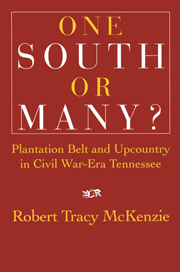"In this excellent study, R. T. McKenzie offers a fresh view of the American South immediately before and after the Civil War....his work should engender considerable discussion." Journal of Appalachian Studies
"In this impressive study of Tennessee's economic structure during the Civil War era, Robert McKenzie challenges recent scholarship on the internal diversity of the South." Historian, Allentown
"[An]...enormous contribution this book makes to our better understanding of the complexities of different regions within the South. ...McKenzie in this path-breaking study has opened new lines of inquiry which must be addressed, one way or another, by all future scholars working in the field. Southern regional or Tennessee sectional heterogeneity can no longer remain an unexamined part of the prevailing historiographical orthodoxy." Georgia Historical Quarterly
"...an erudite, deeply researched, and methodologically sophisticated study....For Appalachian and Southern historians, McKenzie's forthright but scrupulous conclusions demand the closest attention. In short, this is a major work of historical scholarship, made more so by the literate and accessible manner in which the analysis is presented." Martin Crawford, Appalachian Journal
"...an excellent example of quantitative history's virtues....produces a wealth of statistical information for historical analysis...." Fred Arthur Bailey, The North Carolina Historical Review
"...it is impossible to read this book and not appreciate the quality of the scholarship and the careful hand that crafted it. One South or Many? makes excellent use of historical data sources, including information recorded on the original census schedules, testimony before the U.S. Congress, and diaries of farmers and Civil War veterans....McKenzie draws a number of surprising inferences from his evidence.....These are challenging conclusions that no doubt will generate further research." Stewart E. Tolnay, Contemporary Sociology
"The ultimate objective is a better understanding of the complex interplay of socioeconomic reality and popular perception of that reality in the nineteenth-century South, and this book marks an important step in the right direction." Randolph B. Campbell, American Historical Review
"Especially noteworthy are McKenzie's clear text, tables, and graphs, which make his results easily accessible to nonquantitative readers as well as provide comparative data for specialists....McKenzie's impressive... study provides a model research design and reminds us that plantation and nonplantation regions share important structural similarities as well as differences."
"Robert Tracy McKenzie's intelligent and gracefully-written book takes a new look at the long-standing assumption of diversity within the nineteenth-century South...By relating such different locations to similar regions in the South generally, this thorough, creative, and persuasive study suggests several possible answers to the important question posed by the book's title...McKenzie presents this complex picture in clean, clear, and direct prose. Those who might blanch at the prospect of reading a monograph based on quantitative data need not fear this book, for it is free of jargon and cryptic mathematical formulas...McKenzie convincingly and impressively analyzes the methods used in other works, makes critical adjustments, adds his own research, and produces a wealth of evidence to support his arguments." The Journal of East Tennessee History



